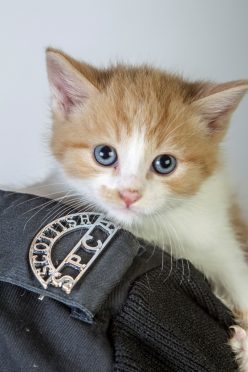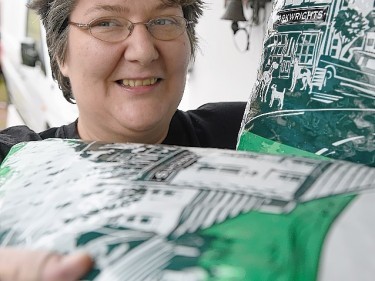A pet can be a lifeline to those living alone, but what happens when money gets tight? Some would rather feed a pet and starve themselves, according to one remarkable woman who is helping feed hundreds of animals across the Highlands, writes Susan Welsh
At this time of year, supermarket shelves are groaning under the weight of tonnes of luxury food. But for many, the festive season is not a time for overindulgence as they can barely afford to feed themselves. Even more worrying is that many people will go hungry to ensure their beloved pet is fed.
It’s a situation that concerned animal lovers, Ali Cuthbertson and her partner, Dave Perry, from Ardgay in Sutherland, so much that a year ago they came up with an idea to help families on low incomes who were struggling to look after their pets.
They set up Parcels 4 Pets, a free food bank service for pets, which has since fed hundreds of animals across the country and helped numerous owners avoid the pain of having to part with a pet simply because they could no longer afford to care for them.
“We started a mobile business delivering pet supplies to remote villages in the north,” said Ali. “But then last year in March I was diagnosed with breast cancer. I underwent six lots of chemotherapy and, as a result, was confined to the sofa for an awful long time. There, I’d pass the time looking at various things on the internet.
“I couldn’t help but notice numerous posts from people asking for help with food and toiletries and was aware in the rising demand for food banks, but it struck me as odd that you never saw people asking for help with pets.”
Before becoming self-employed, Ali was a welfare rights officer and also ran East Sutherland Village Advice Service (now East Sutherland CAB).
“I’d undertake home visits all over Sutherland, helping people get their benefits, but I was always struck by the number of older people who spent next to nothing on themselves but would spend lots of money on their pets.
“Some would rather feed their pet and starve themselves.
“I noticed too a rise in the number of cats, dogs and other pets being abandoned and, put two and two together, and realised some people were perhaps dumping their cats and dogs because they were embarrassed to ask for help to feed them.”
Some may suggest that if you can’t afford to feed a pet, you shouldn’t get one in the first place.
“Circumstances can change quickly. You might have a full-time job, children and a couple of dogs and managing well, then find yourself being made redundant and facing a situation where money is tight,” said Ali.
Ali and Dave have rescue dogs themselves and run a parrot rescue centre from their home, so were fully aware of the problems people face.
Earlier this year, the story of Shar-pei crossbreed Kai, who was abandoned at Ayr Railway Station along with a suitcase of his belongings, touched the hearts of millions, with offers from dog lovers around the globe to take him in. He was rescued by the Scottish SPCA, and the charity chose Ian Russell, 52, from a list of hundreds to give the dog a new start in life.
While abandoning an animal is an offence under the Animal Health and Welfare (Scotland) Act 2006, and anyone found guilty of doing so can expect to be banned from keeping animals for a fixed period or life, a quick look through the Scottish SPCA website reveals details of numerous animals, ranging from rabbits and rats to cats and dogs, being abandoned by their owners.
“Having the pet supply business meant we had access to cost-price food and a van. We contacted the charities, Blysthwood Trust and CCast Highland in Tain and they agreed to distribute the pet food through their food banks,” said Ali.
“When we told people of our plans the response was incredible with people donating pet food, cash and items which could be sold off or auctioned in order to buy food. This year alone we’ve donated more than one and three quarter tonnes of food.
“In the Highlands some people live a fairly isolated life and your pet may be your only companion and the only one you speak to on a daily basis apart from the postie.
“If I had a pound from every person who told me their pet was their reason for getting up in the morning, I’d be a very rich woman,” said Ali, a mum of two grown-up children who shares her home with more than 30 rescued animals. Her own pets include three African gray parrots, three orange-winged Amazon parrots, two disabled wild pheasants, two hedgehogs, a guinea pig, three dogs, nine chickens, a quail and a black headed caique.
The couple no longer run their mobile pet supply business but are dedicated to continuing with their pet food bank.
“Looking back over the year, the demand for pet food is getting bigger. Our plan next year is to get funding and charitable status – as what we’d like to be able to offer is a home drop-off service for those who can’t easily reach the distribution centres.
Those who wish to donate food or cash to help feed pets can do so via their Facebook page, or by sending an e-mail to parcels4pets@outlook.com
Pets at Christmas
While some pets are being abandoned because owners can no longer afford to feed or look after them, others may simply be abandoned because they’re an unwanted present.
This week the Scottish SPCA is advising people not to buy pets as Christmas presents for fear of a surge in abandonment cases. As the charity prepares for its busiest time of the year, it hopes many pets will be spared the heartbreak of being dumped like unwanted gifts after the festive period.
Chief Superintendent Mike Flynn said: “It’s an upsetting reality that, in the weeks and months after Christmas, our centres are often asked to take in puppies, kittens and other pets who were given as presents.
“Even worse, some of these animals are dumped like rubbish once the novelty has worn off.
“Every year in the lead-up to Christmas we stress that animals should never be bought on a whim or given as surprise presents – but some people aren’t getting the message.
“In January this year we took in 235 dogs and over 250 cats and it’s possible some of these animals had been bought for Christmas. For that reason we are asking people to consider whether they have the time and financial resources to be able to properly care for an animal for life.”
In order to reduce the risks of people taking on pets to give away as presents, the charity will stop rehoming puppies, kittens and baby animals between December 19 and January 3.
Chief Supt. Flynn added: “We have to ensure our rescue animals aren’t being taken on by someone who just wants a new pet for Christmas.
“However, our animal rescue and rehoming centres will be open to the public throughout the festive period, including Christmas Day, and young animals can be reserved during this time.
“Our message is simple: a pet is a lifelong commitment and not a present which can be given at Christmas and then forgotten about soon afterwards.”

